Olympics
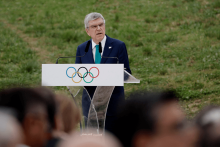
Sports and human rights organizations have called on International Olympic Committee president Thomas Bach to help overturn a ban on French athletes wearing the hijab, saying it undermines celebrations of the first gender-equal Olympics.

The colonial narrative that colonizers sometimes improve the lives of colonial subjects is false and is used as a propaganda tool by those who seek to justify continued invasion and colonization of the world through imperialism.

Ahh, America, the land of the free and the home of the badass Olympians.
But the Olympics has also given Americans an opportunity to rear our ugly heads. The Olympics have shown that in America, we aren’t really free. No, in America you have to play by the rules, and if you don’t live up to national expectations, even an Olympian can become America’s next scapegoat.

It’s good to remind ourselves of this underlying truth of our human family. We hear so many fearful voices in our world nowadays saying we can’t trust those who are different from us. They insist that we can’t let people from other countries get close to us because we don’t know who they are. Instead, they want to build walls and patrol borders and practice exclusion.
Editor's Note: This week's Wrap was guest curated by Sojourners contributor Juliet Vedral. Read along for her top stories and notes from the week!
1. David Crowder: Christians Have to Speak Up for Refugee Children
There are 21.3 million refugees, half of whom are children. The crises that typically create refugees last about 26 years and nearly 34,000 people are forced to flee their homes because of conflict each day. In this piece, musician David Crowder explains why providing education for these kids is a moral imperative.
2. Trump-Loving Christians Owe Bill Clinton an Apology
If you're going to read one of the many articles about evangelicals supporting Donald Trump's candidacy for the presidency, this might be the most important.

The 2018 Winter Olympic Games, the 17-day athletic love-fest kicking off to the beat of the Korean janggu drum in Pyeongchang on Feb. 9, are a secular endeavor featuring more fanfare than faith, more spectacle than spirit.
But it was not always so.

On the seventh day, Simone Biles rests.
That’s the day the world gymnastics champion, who has a clear shot at the medal podium in Rio, goes to church with her family.
Biles, a first-time Olympian, is a Catholic. She has said she routinely lights a candle to St. Sebastian, the patron saint of athletes and of Rio, before each meet.
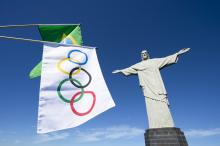
“I dream of sports as the practice of human dignity, turned into a vehicle of fraternity,” the pope says.
“Do we exercise together this prayer intention? That sports may be an opportunity for friendly encounters between people and may contribute to peace in the world.”

THAT STATUE of Jesus standing with outstretched arms over Rio de Janeiro has always made a powerful impression on me; namely, how tired I would get if I did that for very long. These days, I don’t even greet family members with outstretched arms without written permission from my orthopedist, much less stand on a hillside piously overlooking a large population. (Not that anyone would ask me to. I’m very busy.)
It’s an awesome Jesus, although it has no moving parts and doesn’t light up at Christmas. It’s shorter than our own Statue of Liberty, and less green, and you can’t walk up a stairway inside it to peer out the top of his head which, in my opinion, is the creepiest thing you can do inside an American shrine. Unless it’s watching a baby spit up at the top of the Washington Monument, which I did years ago, after walking up the 897 steps to prove the stamina and grit of youth. (Come to think of it, maybe it was me that spit up.)
Nonetheless, that Jesus statue stands over Rio, night and day, making the people below extremely uncomfortable because they’re being constantly monitored by the Risen Lord. One can only hope that Rio’s famous nude beaches are outside his peripheral vision. (No peeking, sir.)
Living in Rio is hard enough, what with speaking a language that’s not quite Spanish. Portuguese is to Spanish as apples are to oranges, if the oranges tasted like bananas. Unlike the rest of South America, Brazil got stuck with Almost Spanish because in the late 1400s colonial powers Spain and Portugal divided up the continent using the negotiating technique of the day: rock, paper, scissors. Portugal chose rock. It was a different time then, with a different mentality. Five centuries later, we now know you should always choose paper.
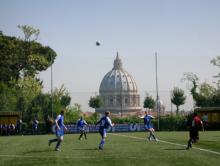
Major sporting events could be held at the Vatican if Rome wins its bid to host the Summer Olympics in 2024.
Pope Francis, a keen soccer fan, is reported to be enthusiastic about the idea. He is expected to meet the head of Italy’s National Olympic Committee, Giovanni Malago, and other officials at the Vatican on Dec. 19 after a Mass to commemorate the committee’s 100th anniversary
Cardinal Jose Saraiva Martins, former head of the Congregation for the Causes of Saints, said he believed Francis would back plans to hold events such as archery in the Vatican gardens.
He told the Florence daily La Nazione that events could also be staged at the pope’s summer palace at Castel Gandolfo outside Rome.
“It seems like a good idea, I think the pope will approve,” Saraiva Martins said.



“Be perfect, therefore, as your heavenly Father is perfect” (Matthew 5:48). Seriously, Jesus? Have you even met some of us? Have you seen the depths of our jealousies, the breadth of our greed? Have you noticed how insatiable our egos are? How deeply insecure we all are?
Perfect?
You cannot mean what you seem to mean.
What then do we do with this seemingly impossible call? For many of us, this is one of those passages in the Bible we seek to explain away. Jesus can’t possibly mean what he says here. We reckon that he must be calling us merely to aspire to perfection. Or we conclude that in calling us to perfection, we realize how very far we are from it and thus lean on God’s grace. But certainly, absolutely, without a doubt, Jesus cannot be calling us to be perfect like God is perfect.
Right?

Like everyone else, I’m addicted to the Twitter photos, Facebook posts, and litany of other social media feeds that are exposing Sochi’s unappealing shortcomings — but am I being fair?
It’s easy for me to forget that I live in one of the richest and privileged countries in the world, and although I consider myself a blue-collar employee working hard to make a living — I’m a citizen of one of the wealthiest and exclusive populations in existence.
I own a car (and a minivan), I have a house (with heating and central air), I buy a cup of coffee every morning, and spend lots of free time watching Netflix on my TV (a modest flat screen). These are just a few of the “normal” things that are luxuries I continually take for granted.
While much of humanity is engulfed in poverty, famine, war, and struggling to develop their society and better themselves — or just simply trying to survive — I’m complaining about the connection speed on my laptop (I may have to use my tablet instead).
Yes, the Olympics spent A LOT of money to create a party-like atmosphere filled with the comforts of Westernized society, but in many ways I’ve become a victim of my own comfort — accustomed to my ethnocentric American lifestyle.
I’m used to clean bathrooms, functional sewer systems, spectacular hotels, and glitzy restaurants — but much of the world isn’t. Whether we want to admit it or not, we live in a bubble detached from the reality of the rest of the world.
It’s easy to laugh at how others live, especially when we don’t have to face the same struggles. We assume our wealth and standard of living actually make us better — we become elitist and exhibit a superior sense of self-righteousness.

More than 1,100 American Jewish athletes will be competing in the Maccabiah Games, known as the “Jewish Olympics” and held in Israel once every four years.
This year’s event, which begins July 18, brings together more than 9,000 athletes from 77 countries to compete in 38 sporting events. The American contingent is the largest visiting delegation.
The Maccabiah attracts well-known and lesser-known athletes. This year’s participants include swimmers Garrett Weber-Gale, who won gold medals in the 2008 Olympic Games in Beijing, and Mirjam de Koning-Peper, one of three medal winners in the London 2012 Paralympics.
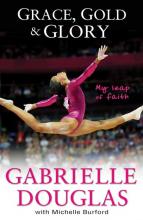
Gabrielle Douglas, who walked away with the gymnastic gold at the London Olympics, is out with her first book: Grace, Gold & Glory: My Leap of Faith. Douglas, who turns 17 on New Year’s Eve, talked with Religion News Service about her prayer life, her love of matzo ball soup and overcoming homesickness to make it to the Olympics.
The interview has been edited for length and clarity.
Q: Everyone knows you as a gold medal Olympic gymnast, but how do you define yourself as a young woman of faith?
A: Faith plays a very big role in my life. I don’t know where I would be without it today. I’ve always been praying for everything. And my mom always exposed me and my siblings to being a Christian and the Bible. I was watching back and looking at the Olympics and my mouth is moving — and that’s me praying.
Outrunning Despair
In the novel Running the Rift, by Naomi Benaron, a young Tutsi runner in Rwanda dreams of competing in the Olympics even as political tensions erupt into unfathomable violence. A story that gives both horror and hope their due. Winner of the 2011 Bellwether Prize for Socially Engaged Fiction. Algonquin
Finally, a "Christian Unicorn"
Perpetually quirky indie artist Sufjan Stevens’ new 58-track, 5-EP Christmas collection Silver and Gold promises to offer “holly-jolly songs of hope and redemption.” Not your typical Christmas music, but who needs more of that anyway? Liner notes include essays by Stevens and Vito Aiuto of The Welcome Wagon. Asthmatic Kitty

Michael Phelps was accomplishing things no one in recorded history has ever done before. I can’t explain or really comprehend how he can do it. And although he did them, I attribute his physiology and gifts to God. So is what he does in the Olympics a miracle?
It almost seems that we worship him as if they were miraculous acts. We literally put him up on a pedestal and adore him, much like how people adored Jesus. And just like with Jesus, these amazing feats, whether or not they are literally miraculous acts, are simply not enough. The fall will inevitably come.
If they were, Jesus wouldn’t have been abandoned at his most vulnerable moment. Some will argue that he saved the biggest and best for last, raising from the dead, which finally put all of his doubters in their place. Really? Then why are our numbers, at least in the Western World, in such precipitous decline?
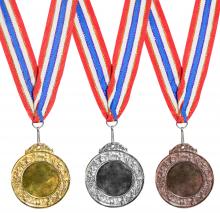
Of course, there’s a part of all of us that loves a winner. There’s a reason why so many people wear the jerseys of their favorite teams or players (way more when that person or team is on top than not, by the way), why we revert to a sort of tribal level of passion — painting our faces, screaming rabidly — and why we practically make a religion out of our sports. At one level, it’s inspiring to see someone achieve what appears to be unattainable. The idea of doing what most Olympians do — or all professional athletes, for that matter — is hard to comprehend. But when we get to witness it, it serves to embolden our faith in humanity a little bit.
Yes, we screw up a lot, we fight each other, and we’re warming up the planet at an alarming rate. But once in a while, it’s transcendent to watch someone do something amazing, beautiful, a little bit closer to perfect.

I have a love/hate relationship with the Olympics. I love the pageantry and global drama of it all. And even as one who hardly ever watches sports (I make exceptions for Roller Derby and Quidditch), I nevertheless find myself glued to the screen whenever the Olympics roll around. At the same time I am uneasy with the neo-colonial aspects of the Games and the fact that one’s ability to win a medal increasingly depends upon how much money one’s country has (making the Games a vivid illustration of global economic injustice). Yet even as I have watched (and enjoyed) the London Games with conflicted emotions, I find myself more and more uncomfortable with the ways the presentation of the Olympics serves to reinforce harmful assumptions about women in our culture.
It started before the Games. As the world geared up for the Olympics, it was hard to avoid hearing some guy or another (from TV hosts to bloggers) saying that what they were most looking forward to watching was women’s beach volleyball. It was this strange inside joke insinuating that the real purpose of the Games was to give them an opportunity to see women diving around in bikinis. I even heard complaints about the new Olympic rule allowing women to compete fully covered (a concession offered to allow Muslim women to compete in the Games). It was uncomfortable to hear how nonchalantly women continue to be reduced to mere sexual objects, but I brushed it aside as typical of our culture.